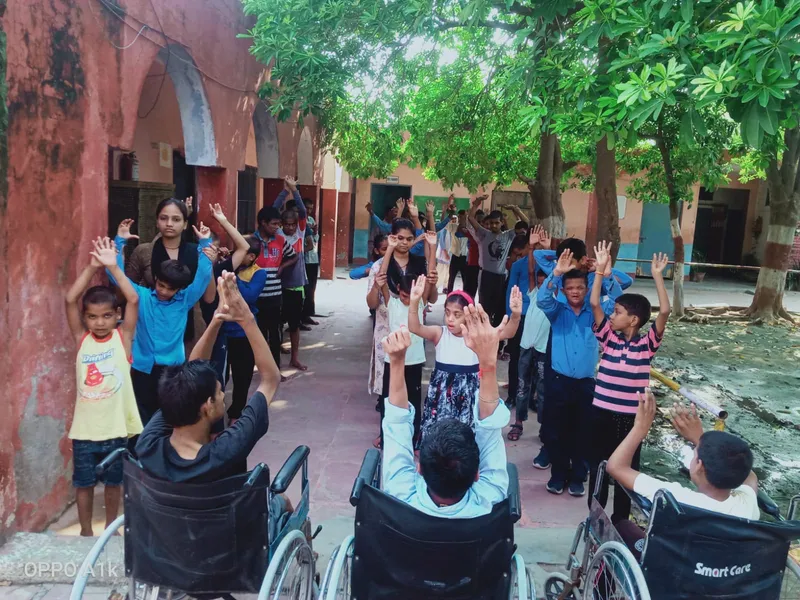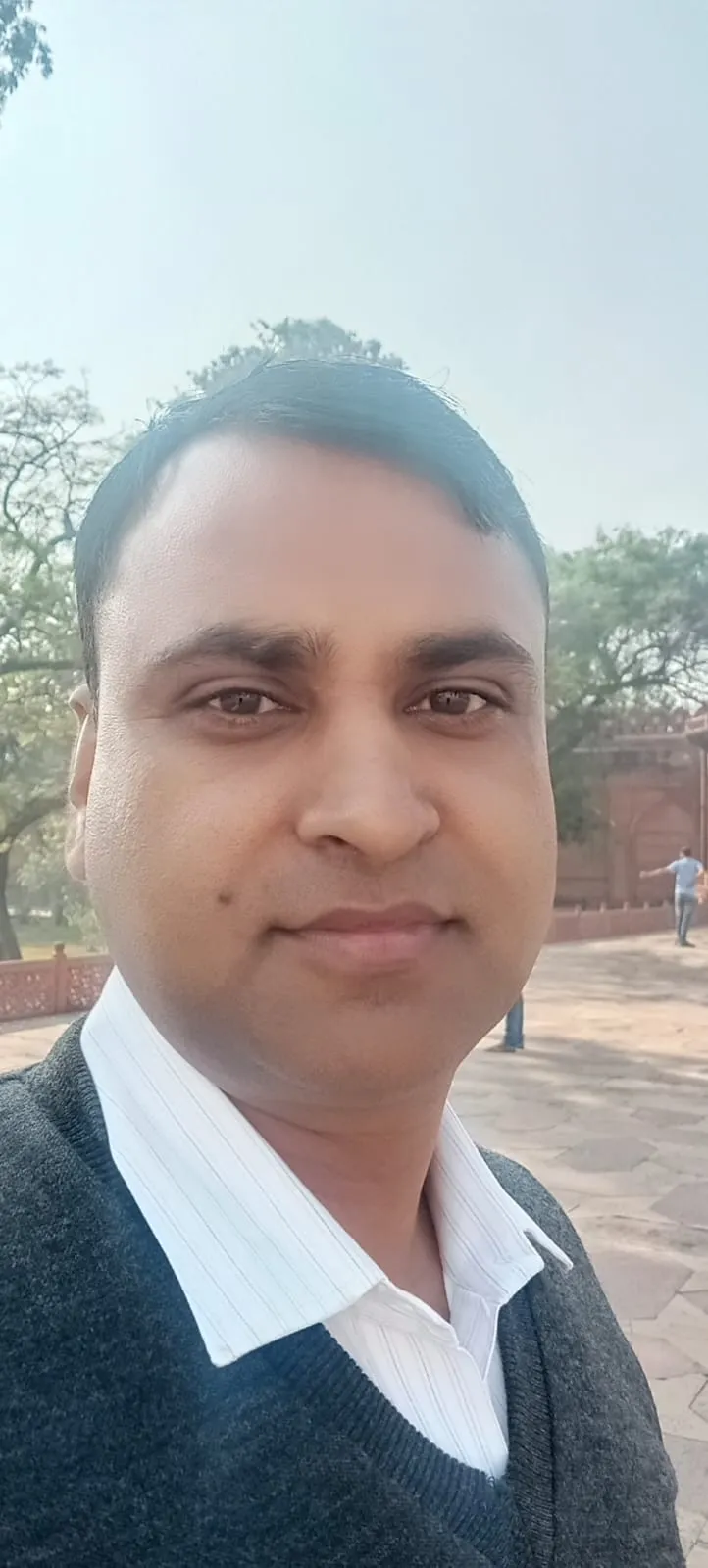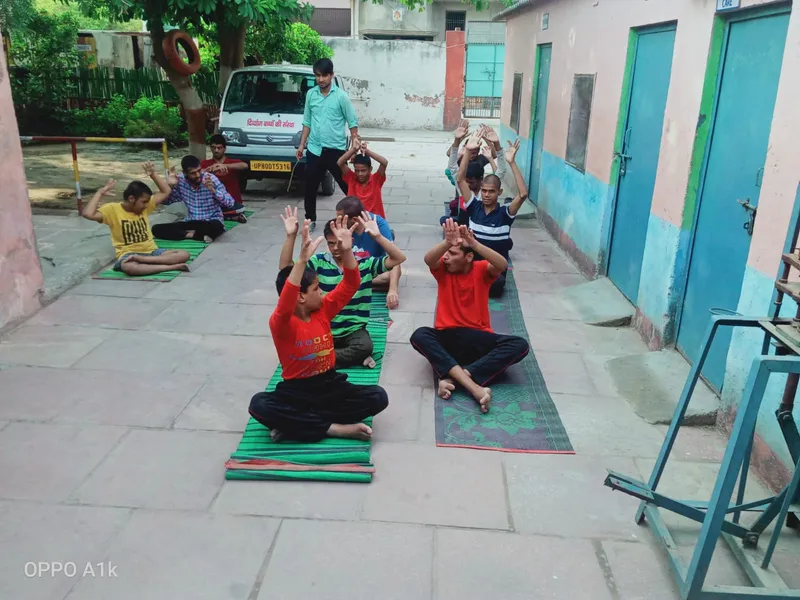'God's work': An Agra educator is on a mission to care for specially-abled children
Anil Joseph started the Integrated Institute of Rehabilitation for the Disabled to cater to children with intellectual and physical disabilities.
Naman (name changed), a 43-year-old man with intellectual disabilities, has found a home away from home at 'Ashray,' a shelter home in Agra. Hailing from Aligarh, he has been residing in the shelter home for people with special needs for the past 15 years.
Every day, Naman takes charge of his own meals and bathing. Buttoning his shirt once seemed daunting, but with practice, he has mastered the task. He then visits the daycare centre where he learns life skills like communication, understanding money exchange etc in a nurturing environment.
Ashray, home to many others like Naman, is run by Anil Joseph, a special educator and Founder of the NGO, ‘Integrated Institute of Rehabilitation for the Disabled’, which caters to children with mental and physical disabilities.

“These children face many difficulties in society. Many of them are rejected by their families, especially those who do not have parents. Their management becomes even more challenging if they have a single parent or if they come from underprivileged backgrounds. In reality, many of these children don’t have a place to call home,” Joseph tells SocialStory.
To back to society, Joseph started the NGO in 2005 and established Ashray in 2008 to care for specially-abled children. So far, the NGO has helped 72 children.
“Being a special educator, I used to visit many such families with specially-abled kids and I realised that some families struggle to bring up such children, Many of these children are often rejected by their families. I just wanted to be a support to these children who don’t have anyone,” he says.
The turning point

Anil Joseph
After completing his Diploma in Special Education in 2002, Joseph started working with children with special needs and understood the challenges they and their families go through. However, he had never planned to start an NGO until one day when he was paying a visit to a clinic and found a woman holding a baby with an intellectual disability.
He came to know that her husband was threatening to leave her because of the baby and she felt helpless. Joseph was determined to do something about the problem and decided to start an NGO.
He started a daycare centre in an old college building in Jangjeet Nagar, Agra in 2005. Later in 2008, he also established a shelter home in Digner, Agra.
The NGO caters to children with Down syndrome, autism, and other genetic conditions, who come from unprivileged families. Additionally, it also helps specially-abled children with single parents.
“We did not focus on these details initially, however, with time, I realised that most well-off families have the resources to take care of such children but their management becomes very tough in families with no parent or single parent, or for the ones from underprivileged backgrounds,” Joseph says.
The NGO provides vocational training, speech therapy, and physiotherapy through a permanent speech therapist and a part-time physiotherapist. Since the degree of disability can vary among children, the training is based on their needs. The NGO has 18 staff members, including drivers, helpers, and cooks.
Upon admission to the shelter home, children’s IQ levels are first assessed and they are then grouped into batches of five or six. The NGO has seven teachers who provide basic education like counting, holding a pencil, drawing figures, and more according to the child’s aptitude for three months. The progress is monitored and an individual education programme is crafted thereafter.
Additionally, the children who are not physically challenged are taught to do activities like making bowls out of dried leaves. “We have an RO plant so we ask these children to go around the area with a supervisor to offer water to the people around. The main aim is to help them with communication and also make them understand basic money transactions,” Joseph explains.
The NGO also engages children in other activities like throwing balls, skating, cycling, and more.
However, Joseph’s journey so far has been challenging. He explains that handling specially-abled children is not easy as they get agitated very easily. Additionally, managing their food, clothing, and shelter requires a huge amount of funds.
“When I started, it was difficult to run the NGO because I did not have any funds and support. Every time I thought of closing it, I saw these children and I was filled with a new zeal. However, with time, a lot of affluent people from Agra and nearby cities came forward to help me with the finances,” he says.
The NGO also runs a teacher’s training programme under the Rehabilitation Council of India. The money earned from the programme is also used to support the NGO.
Joseph, a father of two, sometimes receives pushback from parents who can’t come to terms with the reality of what their children need. He recalls an incident where a family was not able to accept that their child is autistic. “They came to me for help and I told them that the child was autistic but they still believed that he would be able to take care of their family business after some time,” he adds.
However, he doesn’t lose hope. “I believe if you do good, God will help you,” he says.
A place to call home

Yash (name changed), a 19-year-old boy with intellectual disabilities from Varanasi, has been residing in Joseph's shelter home for the past one and a half years. When he first arrived, it was difficult for him to perform basic tasks like feeding himself and using the restroom independently. However, through the support and care provided at the shelter home, Yash has made remarkable progress and can now accomplish these tasks on his own.
Joseph’s first wards—Vishal, Devi and Om—still live in the shelter home as they are treated as outcasts and he believes the situation would worsen if they lose a parent or guardian.
He feels that people like him have an important role to play in making the world a better place for such children.
“I have not thought about the future but I know one thing, this is God’s work and people will come out to carry the baton forward,” he signs off.
Edited by Kanishk Singh







